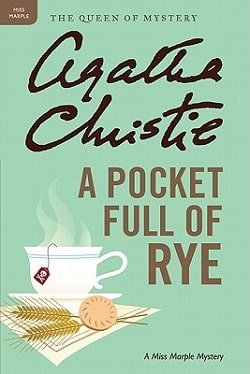Martial Peak Reviews
Agatha Christie’s A Pocket Full of Rye is the seventh installment in the beloved Miss Marple series, and it showcases the author’s unparalleled ability to weave intricate plots with a touch of whimsy. Set against the backdrop of a seemingly mundane English village, the novel opens with the shocking and bizarre death of Rex Fortescue, a wealthy financial tycoon. His sudden demise while sipping tea in his “counting house” sets the stage for a classic Christie whodunit, but it is the peculiar details surrounding his death that truly captivate the reader.
From the outset, Christie introduces us to a world where the ordinary collides with the extraordinary. The discovery of cereals in Fortescue's pockets is a curious detail that hints at a deeper, more sinister plot. This seemingly trivial clue becomes a pivotal element in Miss Marple’s investigation, illustrating Christie’s knack for embedding layers of meaning within her narratives. The phrase “crime by rhyme” serves as a clever motif throughout the story, suggesting that the murder is not merely a random act of violence but rather a calculated event steeped in symbolism and hidden messages.
Miss Marple, the quintessential amateur detective, is at her best in this novel. Christie masterfully develops her character, showcasing her keen observational skills and her ability to draw connections between seemingly unrelated events. As a character, Miss Marple embodies the archetype of the astute elderly woman whose wisdom and understanding of human nature often surpass that of the professional detectives. Her interactions with other characters reveal her depth; she is not just a solver of puzzles but a compassionate observer of the human condition. Through her, Christie explores themes of morality, justice, and the complexities of human relationships.
The supporting cast in A Pocket Full of Rye is equally compelling. Each character is meticulously crafted, with their own motives and secrets that add richness to the narrative. The Fortescue family, in particular, is a study in dysfunction, with their greed and ambition driving them to the brink of madness. Christie’s portrayal of familial relationships is poignant, as she delves into the darker aspects of love and loyalty. The tension between the characters creates an atmosphere of suspense, keeping readers on the edge of their seats as they try to decipher the truth behind Fortescue’s murder.
One of the most striking aspects of this novel is Christie’s use of language and structure. The prose is elegant yet accessible, with a rhythm that mirrors the unfolding mystery. The dialogue is sharp and witty, providing insight into the characters’ personalities while also advancing the plot. Christie’s ability to create tension through her writing is evident as she skillfully reveals clues and red herrings, leading readers down various paths before ultimately guiding them to the resolution.
The themes of deception and the duality of human nature are prevalent throughout the story. Christie challenges the reader to question appearances and consider the hidden motives that often lie beneath the surface. The notion that people are not always what they seem is a recurring theme in her work, and in A Pocket Full of Rye, it is explored through the lens of familial ties and societal expectations. The characters’ interactions are fraught with tension, as their true selves are often obscured by the masks they wear in public.
Moreover, the novel can be seen as a commentary on the socio-economic landscape of post-war England. The financial empire that Rex Fortescue built serves as a backdrop for exploring themes of power, greed, and the moral implications of wealth. Christie subtly critiques the obsession with money and status, suggesting that such pursuits can lead to moral decay and ultimately, tragedy. This thematic depth adds a layer of complexity to the narrative, elevating it beyond a simple murder mystery.
In comparison to other works within the genre, A Pocket Full of Rye stands out for its unique blend of humor and darkness. While many detective novels focus solely on the mechanics of the mystery, Christie infuses her story with a sense of playfulness that is both refreshing and engaging. The clever use of nursery rhymes as a thematic device is particularly noteworthy, as it adds an element of nostalgia while also serving as a chilling reminder of the innocence that can be lost in the face of greed and betrayal.
Overall, A Pocket Full of Rye is a testament to Agatha Christie’s genius as a storyteller. The novel is a masterclass in character development, thematic exploration, and narrative structure. Miss Marple’s journey through the tangled web of deceit and intrigue is both captivating and thought-provoking, leaving readers with a sense of satisfaction as the pieces of the puzzle fall into place. Christie’s ability to blend humor with darkness, along with her keen insights into human nature, make this novel a standout in her oeuvre.
In conclusion, A Pocket Full of Rye is not just a murder mystery; it is a rich tapestry of human emotions, societal critiques, and the timeless struggle between good and evil. For fans of the genre and newcomers alike, this novel offers a delightful escape into the world of Miss Marple, where every clue is a step closer to uncovering the truth. It is a must-read for anyone who appreciates the art of storytelling and the intricacies of the human psyche.
























Reviews 0
Post a Reviews: